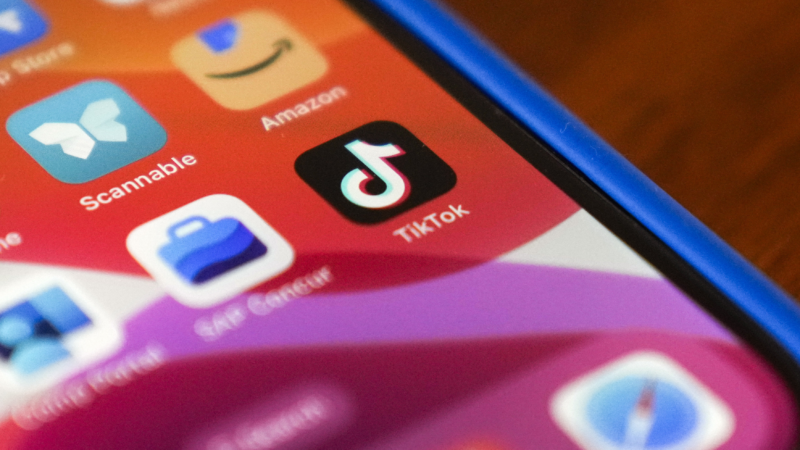TikTok is back on the Apple and Google app stores
Apple and Google have returned TikTok to mobile app stores in the U.S., ending a nearly month-long standoff between the tech giants and the video platform since a law banning the app took effect in January.
By restoring the viral video platform, Apple and Google are allowing the app to be downloaded on mobile devices. It also provides a way for TikTok to send millions of Americans software updates to debug the service and provide security fixes.
The tech firms yanked TikTok from app stores on Jan. 19, the date a law passed by Congress, and upheld by the Supreme Court, took effect.
Under the law, businesses cannot support TikTok as long as it is controlled by ByteDance, a Beijing-based tech company.
But on Thursday, Apple and Google received a letter from Attorney General Pam Bondi informing the companies that the Trump administration will not prosecute them for supporting TikTok, according to sources familiar with the matter who were not authorized to speak publicly about it.
The assurance from Bondi that President Trump would not enforce the law was enough for Apple and Google to bring the app back.
Legal experts say a letter from the Trump administration promising to not prosecute can still mean Apple and Google are in violation of U.S. law.
“You now have some of the biggest corporations in the world accepting the word of the Trump Justice Department that this statute won’t be weaponized against them,” said Georgetown University law professor Anupam Chander. “This could help them stay on the good side of the Trump administration and address the financial hit they’re taking by not hosting TikTok on app stores.”
Representatives from Apple, Google and TikTok declined to comment.
Lawmakers in Washington fear ByteDance is ultimately answerable to the Chinese government, which could make Americans’ data and political views potentially vulnerable to a foreign adversary.
The move by Apple and Google, two of the most valuable companies in the world, carries risk. Under the law, companies doing business with TikTok can face fines of $5,000 per user who is still able to access the app. The penalties could add up to hundreds of billions of dollars.
Trump issued an executive order on his first day in office seeking to provide legal protection to companies that work with TikTok. In practical terms, it instructed the Department of Justice to not hold any companies liable for violating the TikTok ban.
Yet legal experts say a president’s order cannot override an act of Congress, and that doing business with TikTok is still, in theory, punishable with steep fines. That penalty has a statute of limitation of five years, so a year beyond Trump’s term.
The law offers one way out of this impasse: It allows the president to undo the ban if he can show Congress that a deal has been made to sever TikTok from ByteDance, bringing TikTok into compliance with the law. President Trump has said that negotiations are underway, and that he would like the U.S. to have a 50% stake in the video app.
NPR reported last month that Oracle, Microsoft and other American investors are putting together a bid to purchase TikTok’s U.S. operation under the guidance of top White House officials. Under such a deal, ByteDance could retain a minority stake in the video service, according to two people with direct knowledge of the talks who were not authorized to speak publicly about the deliberations, which are still underway.
Other bidders, including the content creator known as Mr. Beast and former Los Angeles Dodgers owner Frank McCourt, have said they are interested buyers.
Some tech companies were quick to reestablish service for TikTok. The morning after the app shut down, Trump posted a message on his social media network promising an executive order on his first day in office that would shield them from liability. Oracle, along with web infrastructure providers Amazon Web Services and Akamai, promptly returned service to TikTok.
It was a symbolically potent gesture, signaling that Trump’s intention to rescue the app from a federal ban was enough for the firms to restore the backbone of TikTok’s web support.
Taiwan’s president pledges to defend island’s sovereignty after Chinese military drills
Taiwanese President Lai Ching-te vowed to defend the self-ruled island's sovereignty in the face of what he termed China's "expansionist ambitions," days after Beijing wrapped up live-fire military drills near its shores.
Deaths reported during widening protests in Iran sparked by ailing economy
The protests began due to economic pressures, with Iran's currency rapidly depreciating. Demonstrators have also chanted against the country's theocracy.
Congress failed to extend Obamacare subsidies. This Democrat says Trump can save them
Sen. Peter Welch, D-Vt., says he thinks the Senate can pass a "retroactive" Affordable Care Act subsidy extension, but "we need President Trump."
Rideshare union rights, social media limits and other state laws taking effect Jan. 1
Every new year, public media reporters across the country bring us some of the new state laws taking effect where they are. Here are six in 2026.
Guides to help you tackle your New Year’s resolutions
From building your strength to tackling credit card debt, NPR's Life Kit has a newsletter journey to help you tackle your New Year's resolution.
Guides to help you tackle your New Year’s resolutions
From building your strength to tackling credit card debt, NPR's Life Kit has a newsletter journey to help you tackle your New Year's resolution.






